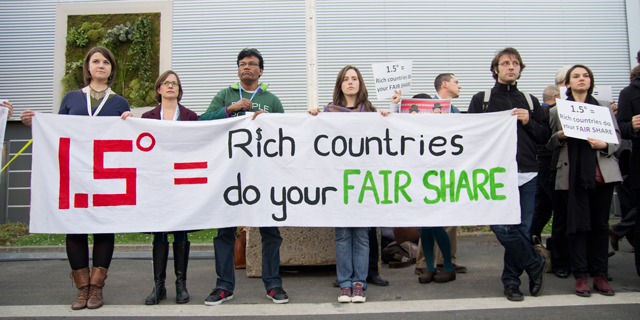COP21 has reached its end game. The Durban platform closed on Saturday, and a new draft has been negotiated by ministers has now been published.
Despite countless closed door meetings, late night sessions, unprecedented exclusion of civil society and attempts by powerful Northern countries to hasten the process, little has been achieved so far.
One of the most salient trends seems to be the willingness of developed countries such as Canada, France and Germany to include the 1.5°C threshold – a seemingly ambitious step up from 2°C. But this seemingly positive step – which we have advocated for during the COP – hides a more disturbing fact: there is nothing in the agreement which can feasibly allow the world to achieve that target.
We cannot just will a temperature target into existence. Limiting warming to 1.5C will require science-based, bold and transformative action to ensure we keep 80% of fossil fuels underground.
To put it simply, staying below 1.5C in a just way will require the wholescale transformation of national economies. It will require reductions of CO2 emissions by over 80% in the EU, Australia and the United States over the next fifteen years. It will require an immediate, fast-paced decarbonisation of the economy, across agriculture, energy, transport, and forestry.
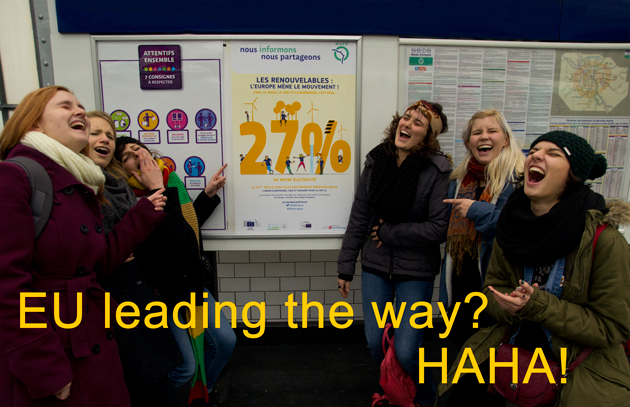 Given the necessary ambition, can we really interpret the rich countries’ lofty intentions at face value? Can we really believe that the EU is going to dramatically revise its ambitions? Can we really foresee that the United States, currently committing to a fifth of its fair share, will rise to the challenge? There are strong reasons to be wary of these scenarios.
Given the necessary ambition, can we really interpret the rich countries’ lofty intentions at face value? Can we really believe that the EU is going to dramatically revise its ambitions? Can we really foresee that the United States, currently committing to a fifth of its fair share, will rise to the challenge? There are strong reasons to be wary of these scenarios.
Under current plans to inscribe a mitigation target of 1.5C, the Paris agreement will present ambition on paper, backed up by nothing. It will be little more than a careful deception, designed to maintain an illusion of success, and prolong the procrastination on tackling climate change. We must therefore be wary of the fanfare, shying away from trumpeting an agreement that promises but cannot deliver. We must cautiously read the fine-print on adaptation, differentiation, accountability, and loss and damage.
In addition, any agreement will not cover emissions from aviation and shipping. Were these sectors to be counted as countries, they would both be in the top 10 emitters worldwide.
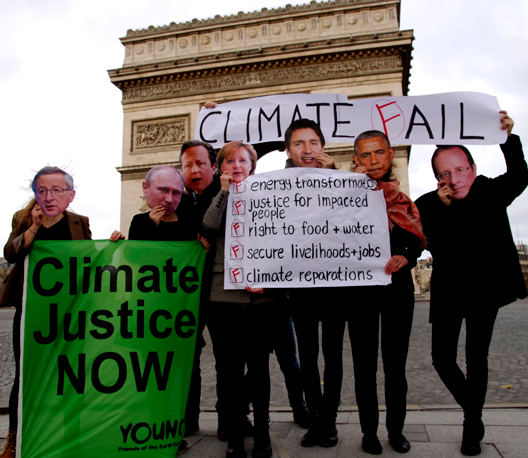 Moreover, the 1.5°C rhetoric is being abused to try to divide the G77 bloc of developing countries, and force them to concessions on finance, as part of the classic blame-game. Again, just like in Copenhagen, the USA and other rich countries that owe a big carbon debt to the developing world have decided where to point the finger of blame if things don’t go their way in Paris. What we have witnessed so far, is that the governments and media of the Global North countries put the blame for lack of progress on southern countries like India, who call for a fair and just agreement, while the US and the other developed countries refuse to take responsibility for their historic emissions. Ahead of Paris, India was already being painted as the key troublemaker for the strong position it held on climate at the recent G20 meeting. In a non-paper sent around ahead of the summit, US negotiators clearly stated that they will not respect the principle of common, but differentiated responsibility, as it is reportedly an “outdated concept”. The COP is still a rigged game, with rich countries trying to evade their responsibilities and force their positions through.
Moreover, the 1.5°C rhetoric is being abused to try to divide the G77 bloc of developing countries, and force them to concessions on finance, as part of the classic blame-game. Again, just like in Copenhagen, the USA and other rich countries that owe a big carbon debt to the developing world have decided where to point the finger of blame if things don’t go their way in Paris. What we have witnessed so far, is that the governments and media of the Global North countries put the blame for lack of progress on southern countries like India, who call for a fair and just agreement, while the US and the other developed countries refuse to take responsibility for their historic emissions. Ahead of Paris, India was already being painted as the key troublemaker for the strong position it held on climate at the recent G20 meeting. In a non-paper sent around ahead of the summit, US negotiators clearly stated that they will not respect the principle of common, but differentiated responsibility, as it is reportedly an “outdated concept”. The COP is still a rigged game, with rich countries trying to evade their responsibilities and force their positions through.
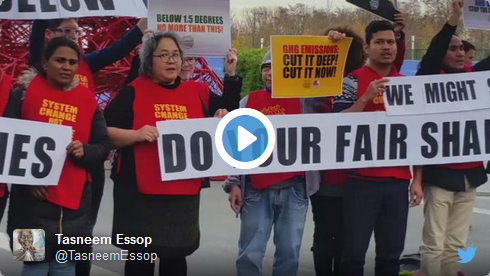
VIDEO: Climate activists call on rich countries to do their fair shares at #COP21Paris
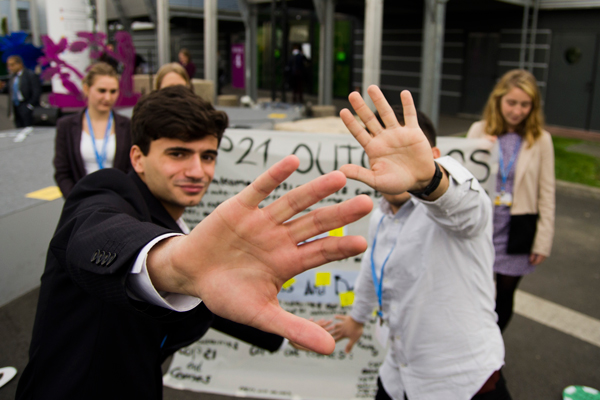 Transparency of the negotiations has also been unprecedentedly opaque at this COP. Let us stress, that civil society was denied access to most of the spin off groups, where the actual negotiations happen in COP21. There was no formal decision on this. The argument was there is a lack of capacity and video streaming is not possible – a difficult position to accept given the huge expense spent on this COP.
Transparency of the negotiations has also been unprecedentedly opaque at this COP. Let us stress, that civil society was denied access to most of the spin off groups, where the actual negotiations happen in COP21. There was no formal decision on this. The argument was there is a lack of capacity and video streaming is not possible – a difficult position to accept given the huge expense spent on this COP.
And the nice talk by negotiators should also not hide the fact that the corporate capture of the summit is rampant and widespread. The false solutions big business exposition “Solutions COP21” is just taking place in the Grand Palais, including dirty COP-sponsors like the French coalmine operator Engie. On Friday December 4th, police cracked down on peaceful protesters (including us), trying to silence our attempts to expose the climate criminals trying to greenwash themselves as “part of the solution” and curb the negotiations in their favour.
Despite how the push for 1.5°C is gaining momentum, and how some are already celebrating, there is an increasing effort by rich countries to put more pressure on developing countries and show no ambition to do more on their own. It also shows the strategy of rich countries to present this as a leap forward and to depict the Paris Agreement as huge success while there is no real action on climate and justice at all. We must not allow them to get away with this, and instead push for real commitments in the closing days, and prepare to fight for climate justice in a world where political leadership has reneged on its responsibilities.
So what exactly is left to change in the agreement?
So what exactly is left to change in the agreement?
Mitigation:
There still is a huge ambition gap of 18 GigaTons of CO2 equivalent which has to be covered by rich countries. Countries from the Global South actually do more than what their fair share is already.
Pre-2020:
We know that emissions have to peak before 2020 to keep us under 1.5°. But the Paris agreement is supposed to be post-2020. So how are we going to ensure its success?
Finance:
There is still by far not enough money to cover the cost for mitigation, adaptation and loss & damage pledged in the Green Climate Fund, and we see no ambition from the Global North to change that. Instead it is trying to weaken the Fund by shifting away from its responsibilities and making developing countries contribute over the odds.
Adaption:
Developed countries have been trying to water the ambitions paragraph down to reduce the number of recipients, to pay less and not face up to their responsibility.
Loss & Damage:
Developing countries are calling for a Loss and Damage paragraph on its own, but rich countries are still blocking progress. Instead they are pushing for an insurance solution, which would put the burden of insurance premiums on the poorest, who are impacted the most.
Human Rights:
Just in the preamble, not in the binding agreement. Norway, which portrays itself as a progressive actor, is particularly forceful in wanting to scrap every bit of human rights language from the text.

